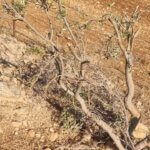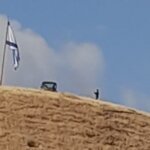Freedom Theatre visits Fasayil
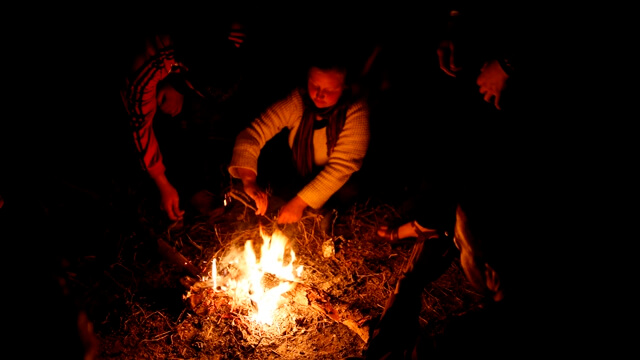 On March 22, 2015, the Freedom Bus arrived in the Jordan Valley, where we met with the coordinator of Jordan Valley Solidarity, Rashed. The Freedom Bus’s first stop in the Jordan Valley was at Arabi al-Ka’abneh. The riders got off the bus and gathered at the cross roads of Omer colony, where Rashed explained the situation in the area. We saw the first Israeli colony created in the Jordan Valley. The Omer colony was the first to a well to collect all the water in the area and prevent the Palestinians from accessing it. Then the group travelled to Al-Auja spring, where Rashed explained Israel’s plan to control all the water resources in this area. He showed us the well there that collects al-Auja’s river water. Rashed told us that Israel’s policy of taking all the water and preventing Palestinians from taking it is part of Israel’s long term plan to eliminate Palestinian existence in the Jordan Valley. We then moved to Fasayel village, where the Jordan Valley Solidarity centre is located. There we met with Nevene Baratmi who explained to the international writers about the Palestinians legal situation in the Valley. In the evening we watched the documentary, the Last Shepherd, which explained Israel’s ethnic cleansing policy toward the Palestinians in the Jordan Valley.
On March 22, 2015, the Freedom Bus arrived in the Jordan Valley, where we met with the coordinator of Jordan Valley Solidarity, Rashed. The Freedom Bus’s first stop in the Jordan Valley was at Arabi al-Ka’abneh. The riders got off the bus and gathered at the cross roads of Omer colony, where Rashed explained the situation in the area. We saw the first Israeli colony created in the Jordan Valley. The Omer colony was the first to a well to collect all the water in the area and prevent the Palestinians from accessing it. Then the group travelled to Al-Auja spring, where Rashed explained Israel’s plan to control all the water resources in this area. He showed us the well there that collects al-Auja’s river water. Rashed told us that Israel’s policy of taking all the water and preventing Palestinians from taking it is part of Israel’s long term plan to eliminate Palestinian existence in the Jordan Valley. We then moved to Fasayel village, where the Jordan Valley Solidarity centre is located. There we met with Nevene Baratmi who explained to the international writers about the Palestinians legal situation in the Valley. In the evening we watched the documentary, the Last Shepherd, which explained Israel’s ethnic cleansing policy toward the Palestinians in the Jordan Valley.
The second day in the Jordan Valley was “the day of the big walk”. We walked through several Palestinian communities in Area C, where the people suffer under Israel’s policy of ethnic cleansing. This policy includes demolishing homes and property, confiscating water and arresting Palestinians, mostly in areas labeled closed military zones, where Israel forbids Palestinians from living although they have lived there for generations. We began our journey in Jiflik village, where we met the manager of Jiflik Women’s Association. She explained the situation in Jiflik, and how people are leaving because they do not have enough water for agriculture, which is their main source of income. She told us about how the Women’s Association helps give women opportunities to work, so they can support themselves economically. They work largely using local resources, like sheep wool, knitting and making accessories from date and olive pits.
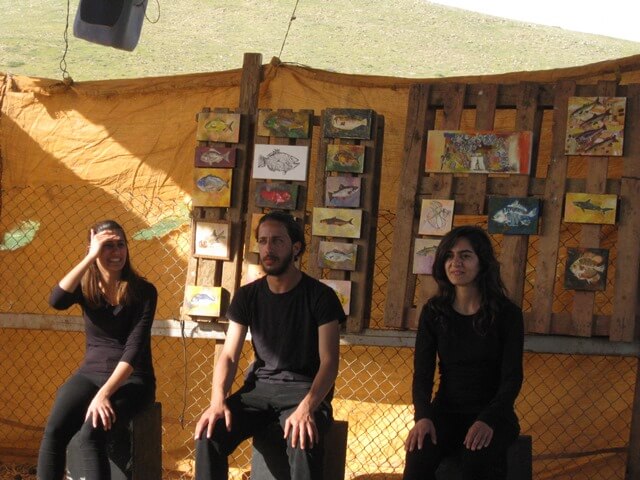 The Freedom Bus then moved to Samra. We gathered in a school that the Jordan Valley Solidarity and the Freedom Bus began building out of mudbricks three years ago. In Samrah, children must walk long distances to go to school usually in difficult conditions, such as hot and cold weather, and under risk of being harassed by the army and settlers, often leading to families preventing their children, especially daughters, from going to school at all. Having a school in Samrah would allow children to go to school in a safe space in their local community. The Israeli army is trying to prevent this school from being built by placing two demolition orders on it. Furthermore, despite the PA’s duties to the Palestinians, it has not supported the construction of the school or offered to provide teachers for it.
The Freedom Bus then moved to Samra. We gathered in a school that the Jordan Valley Solidarity and the Freedom Bus began building out of mudbricks three years ago. In Samrah, children must walk long distances to go to school usually in difficult conditions, such as hot and cold weather, and under risk of being harassed by the army and settlers, often leading to families preventing their children, especially daughters, from going to school at all. Having a school in Samrah would allow children to go to school in a safe space in their local community. The Israeli army is trying to prevent this school from being built by placing two demolition orders on it. Furthermore, despite the PA’s duties to the Palestinians, it has not supported the construction of the school or offered to provide teachers for it.
Then we walked over a hill to the community of Mak-hul. This community was demolished three times in one month last year, and was demolished again one week ago. We saw the difficult living conditions of Palestinians in this community and were impressed by how they continue to live on their land despite Israel’s many attempts to kick them out.
We continued to Al-Hadidiya where we met with one of the most important activists in the Jordan Valley, Abu Sakr, in his home. Abu Sakr presented a moving speech about the history of the area starting from before 1967, and Israel’s changing policies since 1967 that aim to push Palestinians from their land. Abu Sakr has suffered a lot from Israel’s policies throughout his life. His family has suffered through 6 home demolitions. He also lost his son who died after falling off a tractor because there are no close clinics or hospitals in the region and they had to wait six hours for an ambulance . He also shared the story of one of his daughters being born while his house was being demolished. He named her Samud. Abu Sakr is a true example of a Palestinian who stands his ground, and believes in his right to stay generation after generation on his land.
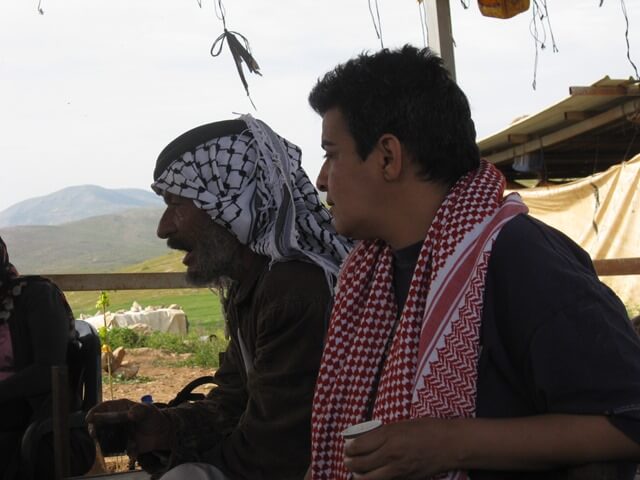 After Abu Sakr’s speech, the Freedom Bus did a playback performance. In playback theatre, the actors listen to the stories of audience members and then act them out. Three actors from the Freedom Bus acted out the stories of Abu Sakr, his son and others from Al Hadidya, as well as others in the audience. Many of the stories involved the audience members mistreatment by the Israeli army.
After Abu Sakr’s speech, the Freedom Bus did a playback performance. In playback theatre, the actors listen to the stories of audience members and then act them out. Three actors from the Freedom Bus acted out the stories of Abu Sakr, his son and others from Al Hadidya, as well as others in the audience. Many of the stories involved the audience members mistreatment by the Israeli army.
Then we continued our walk to the Al-Hadidiya well, another well used to control water resources and prevent Palestinians from accessing them. We saw how excess water is left to fall on the ground, and Palestinians are forbidden from even taking this water.Then we continued to the main road, Al-Akhmar, where we saw the trench that disconnects the surrounding areas, and the gate that is open only once in the morning and once in the evening to allow people to cross the trench. We went back to the JVS centre, where we saw a powerpoint presentation with facts and numbers about Israel’s long term plan to push Palestinians from their land and how it affects Palestinian on the ground. On March 24, the Freedom Bus went tree planting in Beqa’Ot. They returned to Fasayil for lunch. Following lunch, the group split in three. One continued tree planting in Fasayil, another helped make mudbricks using JVS’s mudbrick machine and another played games with the children. After a long day of community service, they had dinner in the JVS centre before heading to Jericho.

